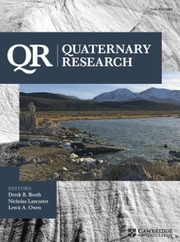Article contents
On the Age and Origin of Lake Ejagham, Cameroon, and Its Endemic Fishes
Published online by Cambridge University Press: 20 July 2017
Abstract
Lake Ejagham is a small, shallow lake in Cameroon, West Africa, which supports five endemic species of cichlid fishes in two distinct lineages. Genetic evidence suggests a relatively young age for the species flocks, but supporting geologic evidence has thus far been unavailable. Here we present diatom, geochemical, mineralogical, and radiocarbon data from two sediment cores that provide new insights into the age and origin of Lake Ejagham and its endemic fishes. Radiocarbon ages at the base of the longer core indicate that the lake formed approximately 9 ka ago, and the diatom record of the shorter core suggests that hydroclimate variability during the last 3 millennia was similar to that of other lakes in Cameroon and Ghana. These findings establish a maximum age of ca. 9 cal ka BP for the lake and its endemic species and suggest that repeated cichlid speciation in two distinct lineages occurred rapidly within the lake. Local geology and West African paleoclimate records argue against a volcanic, chemical, or climatic origin for Lake Ejagham. Although not conclusive, the morphometry of the lake and possible signs of impact-induced effects on quartz grains are instead more suggestive of a bolide impact.
- Type
- Tribute to Daniel Livingstone and Paul Colinvaux
- Information
- Quaternary Research , Volume 89 , Issue 1: Tribute to Daniel Livingstone and Paul Colinvaux , January 2018 , pp. 21 - 32
- Copyright
- Copyright © University of Washington. Published by Cambridge University Press, 2017
References
- 2
- Cited by


